On Easter Monday came a glimpse for Tottenham into something they haven’t had for a decade: a future without Son Heung-min.
Nottingham Forest were visiting and Spurs had by this stage of the campaign surrendered hope in all but the Europa League, but there was another reason for an unusual number of empty seats and it was not lost on those in the boardroom.
Son was ruled out, his absence confirmed more than 48 hours previously by then-head coach Ange Postecoglou. This was the first home match he missed during a month out with a foot injury.
Out with him went hundreds of the South Korean fans who have become such an intrinsic part of the matchday experience in N17 over recent years, perhaps the most vivid illustration of the Premier League’s global appeal.
An estimated 5,000 Koreans attend Spurs home games to see their favourite player pull on the shirt of their favourite football team and compete in their favourite competition.
Many, especially those jetting into London on tourist packages, are committed spenders in the club megastore and remain digitally engaged when they leave.
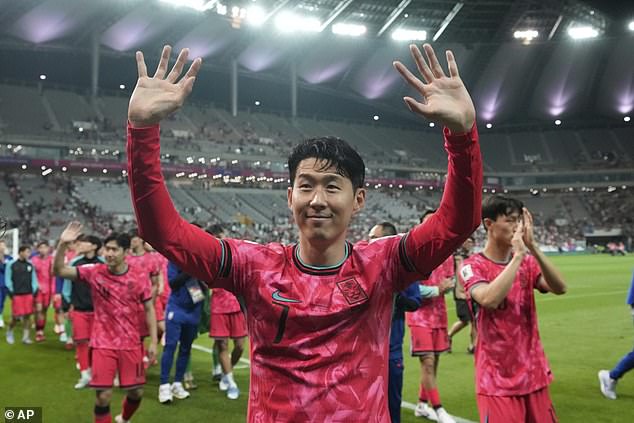
Son Heung-min is a national hero in South Korea, as their captain and best ever player
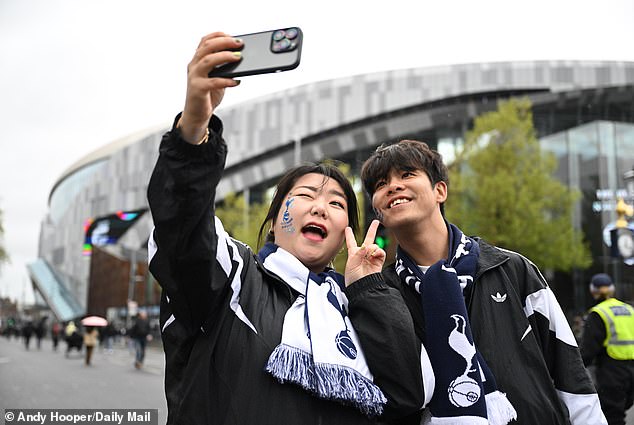
An estimated 5,000 Koreans attend Spurs home games to see their favourite player pull on the shirt of their favourite football team and compete in their favourite competition
For the Bank Holiday fixture against Forest, however, they were conspicuous by their absence and the official attendance was recorded at 59,314, the only time it dipped under 60,000 in the Premier League last season.
Still a decent crowd in the circumstances, and yet here was a reminder. No Son, no K-Factor. Korean fandom, though passionate in the extreme, is firmly aligned to the individual player and not the club.
Much of the annual Son-related income – estimated by industry experts to be in the region of £40-60million a season – is in the balance when he leaves and after 10 years of service, 173 goals in 454 games and that glorious Europa League triumph in May, that moment may soon be upon us.
Son is 33. His form last season was disappointing. Injuries niggled away. His contract expires next year and there appeared no interest from the player’s camp to sign an extended deal during talks last season.
Chairman Daniel Levy, averse to letting players leave on out-of-contract frees ever since Sol Campbell walked down the Seven Sisters Road to Arsenal in 2001, will consider offers for his captain before the transfer deadline, with serious interest shaping up from Los Angeles FC.
First though, Tottenham embark on another money-spinning tour of Asia where they have friendlies in Hong Kong and South Korea.
Spurs are unusual in that they have forsaken the USA, where they have not played since 2018, in favour of Asia and a strategy built around the twin pillars of Son and a 12-year partnership with shirt sponsors AIA, an Asia-only life insurance company.
Two years with Postecoglou in charge gave an Australian element to the Pacific reach but South Korea has been the main attraction with Son, a genuine megastar in the social media age.
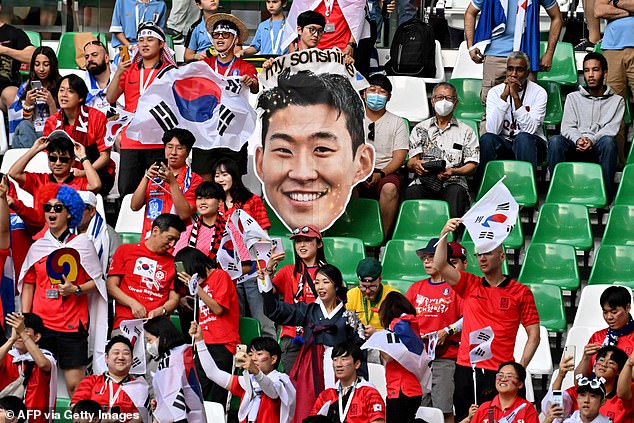
South Korea has been the main attraction with Son, a genuine megastar in the social media age
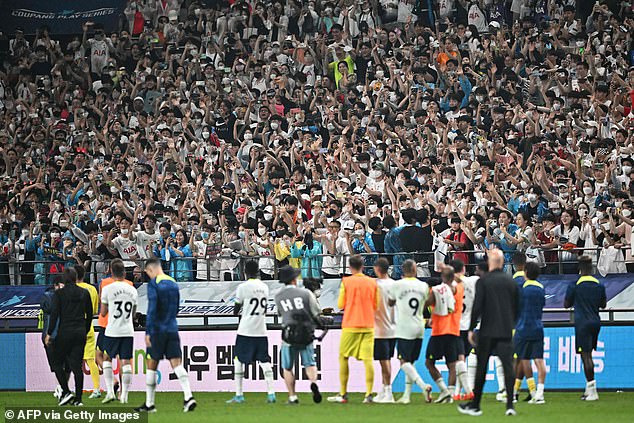
Much of Tottenham’s annual Son-related income – estimated by industry experts to be in the region of £40-60million a season – is in the balance when he leaves
The Coupang Series friendly against Newcastle on August 3 in Seoul will be Tottenham’s third visit to the country in four years and the fixtures are much more lucrative if Son plays – so there was never any prospect of selling him before the tour.
He gives them extraordinary added value. Without Son the match fee would be slashed, a standard contractual clause for all Premier League clubs and their big stars when negotiating preseason tours and exhibition games, but critical to the fee Spurs can command in Asia.
AIA research claims that about 12million South Koreans cite Spurs as their favourite football team. That’s one in four. This is clear on match day at the Tottenham Hotspur Stadium, where they sell up to a thousand official ‘Son 7’ shirts at a rate that outsold Harry Kane’s ‘Kane 10’ shirts by five-to-one before the homegrown hero and England captain left for Bayern Munich.
Every day there are Korean fans at the gates of the training ground with gifts for Son and requests for signatures and selfies. More online merchandise is shipped to South Korea than any country outside the UK, helped by a special rate on postage.
Tottenham’s friendlies in Seoul and Suwon in 2022, when Son had just won the Premier League Golden Boot, were preceded by 4,800 official shirts sold direct to South Korea inside six weeks.
More than 100,000 attended the two games, and online queues meant that the tickets were effectively sold out before they went on sale. The game in Seoul against the K-League All Stars was streamed by more than two million live on Coupang’s streaming service.
Besides touring income and matchday income, Son is a powerful force behind Tottenham’s licensing income in Asia. As of 2024, Spurs had 15 official licensees in South Korea alone, producing and marketing all manner of club-branded everyday items ranging from bottled water to buns and biscuits to stickers and framed art.
South Korea is a western-facing consumer society that has an affluent middle-class with disposable income. National identity is strong and extends through its diaspora, as you might expect from a nation that has been on a war footing for 75 years.
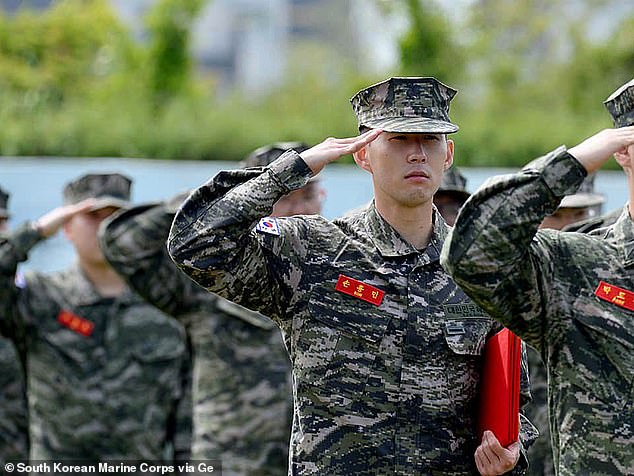
Son completed three months of military service in his homeland in summer 2020
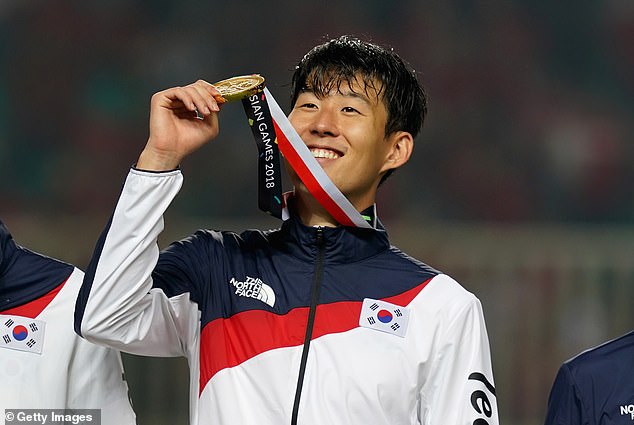
He was allowed to avoid the usual 21-month programme due to winning gold for South Korea in the 2018 Asian Games
Son himself conducted three months of military service in 2020, being exempted from the full mandatory 21-month programme due to being part of the South Korea national team that claimed victory in the 2018 Asian Games.
Footballers rank among Korea’s key ambassadors with standards of behaviour and respect as important as their football achievements. The player matters most not the club they represent.
They adore Son and he appreciates their following, which is why as well as the contractual obligations, he did not want to miss out on what could be this final tour in the colours of the club he is synonymous with.
Ninety-two per cent of Korean Spurs fans identify as Son fans, according to Neil Joyce, co-founder of CLV Group, a leading data and insights company for sports and entertainment.
‘The upside is that eight per cent of Korean fans are Spurs fans first but there’s likely to be a huge drop off in fandom if and when Son departs,’ says Joyce. ‘It will be difficult but not impossible to maintain some level of following.’
Park Ji-sung spent seven years at Manchester United from 2005, winning the Premier League title four times and drawing Korean support to Old Trafford. But even United’s immense global popularity could stop many of them drifting away, before realigning with Spurs when Son arrived from Bayer Leverkusen in 2015 and grew in stature.
‘Manchester United is a special case,’ explains Lee, a South Korean journalist and author. ‘At that point, they had Sir Alex Ferguson, Cristiano Ronaldo, Wayne Rooney and many superstars of football world.
‘They had their Korean fans even before and they have stayed loyal but, most of those watching because of Park lost interest after he left. Spurs will have a similar situation, I believe. There were Korean Spurs fans before Son. They had Lee Young-pyo, another Korean legend and stars like Gareth Bale, Dimitar Berbatov and Luka Modric and a reputation for attractive football and this hardcore won’t change.
‘However, the wider portion of general Korean football fans will lose interest once Son leaves Spurs. It’s not about Son and Spurs, it’s because they are more interested in Korean players than their European clubs.’
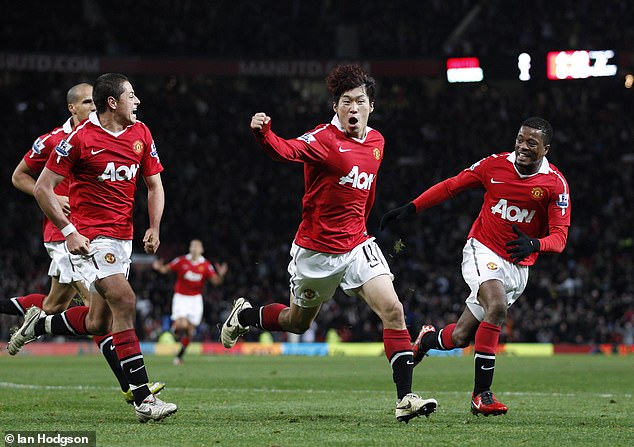
Most of Manchester United’s South Korean fans are believed to have stopped supporting them when Park Ji-sung left
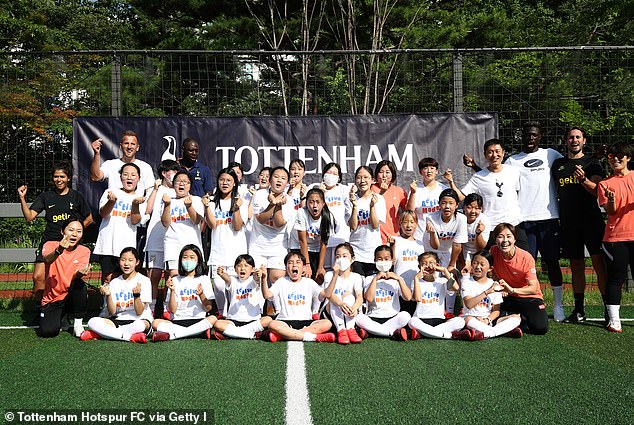
Ninety-two per cent of Korean Spurs fans identify as Son fans rather than supporting the club first and foremost
A move to Saudi Arabia would have offer a chance for Son to compete in his native South Korea in the Asian Champions League and Spurs would probably bank a handy fee from the oil-rich clubs.
But there was interest from there two years ago rejected by Tottenham and it became clear at the time that Saudi Arabia did not appeal to Son as a future destination.
The USA on the other hand does. In Los Angeles there is the largest Korean population outside Korea and many lucrative personal commercial possibilities ahead of next year’s World Cup finals in North America, a tournament for which South Korea have already qualified.
In baseball, they are familiar with the pulling power of an Asian sporting icon. Lee Jung-hoo is in the second of a six-year deal worth £84m as an outfielder for the San Francisco Giants.
Lee, the son of a Korean baseball legend of the ‘90s who was nicknamed ‘Son of the Wind’ (Lee Jnr is ‘Grandson of the Wind’), is finally getting his feet under the table in the US after an injury-curtailed debut, and his shirts are selling six times faster than the next most popular.
One section of the stadium has been designated to his fan club, which goes by the name ‘Jung-hoo Crew’, and the Giants’ marketing team are in overdrive, signing deals with sponsors and broadcasters to beam matches live into South Korea.
Shohei Ohtani, the Japanese megastar at LA Dodgers that many deem the most talented on the planet due to his unique ability to both pitch and hit, has a 10-year contract worth £700m – and will be worth far more to the Dodgers in commercial value over the length of that deal.
Son’s exit would prompt Spurs to return their focus to areas like the USA, with all the digital engagement and layers of marketing expertise built up through the latter half of his decade at the club.
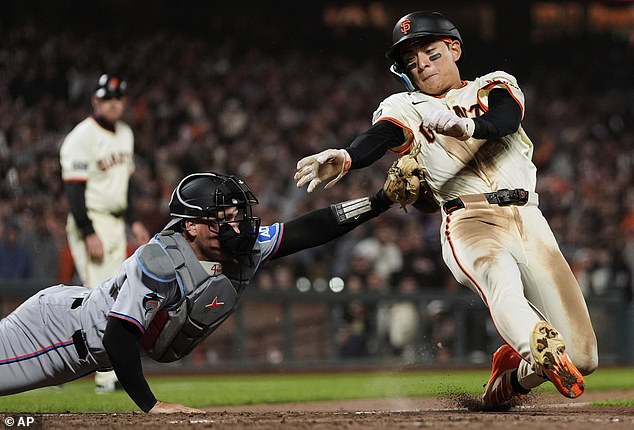
In baseball, they are familiar with the pulling power of an Asian sporting icon. Lee Jung-hoo is in the second of a six-year deal worth £84m as an outfielder for the San Francisco Giants
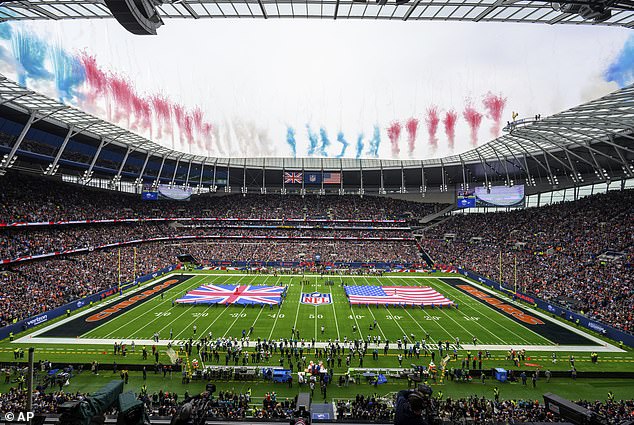
Spurs are well set for an offensive across the Atlantic with the NFL at the heart of the stadium project
According to Joyce of the CLV Group, data shows that the top 14 clubs in European football are leaving a billion dollars a year in potential revenue untapped in the USA by failing to ‘identify, connect and engage’ with their fans in that market.
Spurs are well set for an offensive across the Atlantic with the NFL at the heart of the stadium project. At the same time, they will continue to nourish their South Korean stronghold.
This summer, there was a link-up with K-Pop boy band Stray Kids for two sold-out concerts at the Tottenham Hotspur Stadium. Limited editions of the new black away shirts featuring the Stray Kids logo went on sale at £250 each to mark the occasion.
‘It enables Spurs to build on connections with those fans regardless of Son,’ says Joyce. ‘They are a club doing this sort of thing really well, thinking creatively about content and their direct relationships with fans who can’t come to the game.’
Then there is their teenage winger Yang Min-hyeok, signed from Gangwon last year. The 19-year-old spent five months from January on loan at Queen’s Park Rangers, who sold more shirts in his name during that time than any other player across the entire season.
He made his South Korea debut in March yet remains some distance from a regular place in Thomas Frank’s team.
‘Korean fans regard Korean players in Europe as the nation’s pride,’ says journalist Lee. ‘They feel happy when those players are performing well and bad when they have hard times and are criticised.
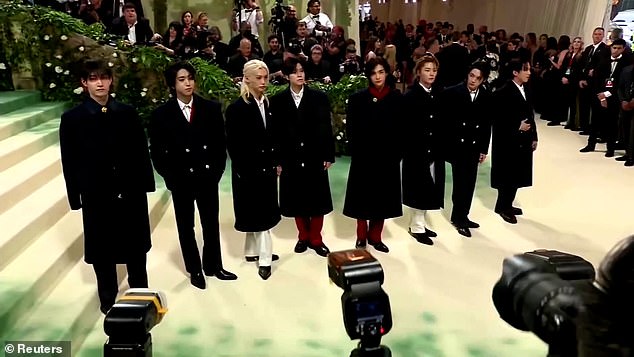
Stray Kids, a K-Pop band who have held two sold-out gigs at Tottenham’s stadium
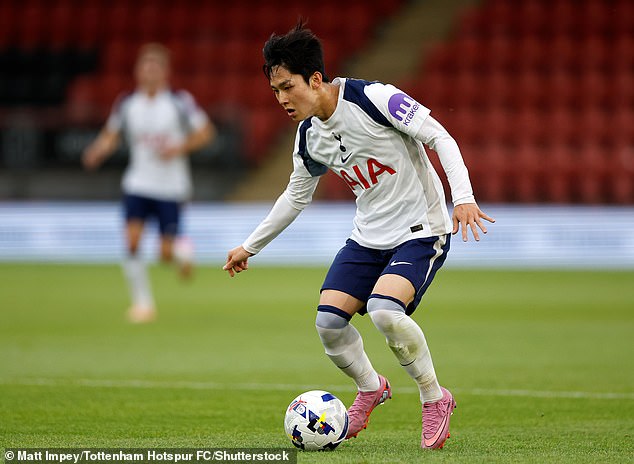
Tottenham have also signed winger Hang Min-hyeok this year, though he is a way off from the starting lineup
‘This is one reason for their passion and the many Korean flags you see in the stadiums. There is a strong bond. The Korean players in Europe are kind of representatives.
‘But there’s an important point, because some clubs think they will get the interest and support of Korean fans simply by buying a Korean player, but it could work only if they are in the first team.
‘Otherwise, the fans would feel the Korean player is wasting his time in the club so the situation could backfire, and the Korean fans could have negative views on those clubs.’
First though, another jaunt east. To Hong Kong and South Korea with Son at the vanguard. Prepare for the hysteria. And kerching! Once more unto the merch, dear friends.












